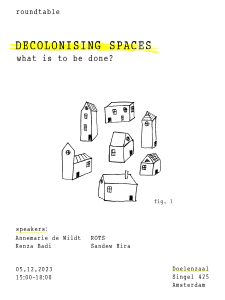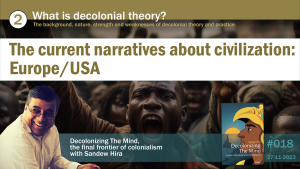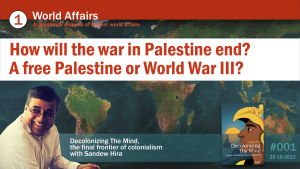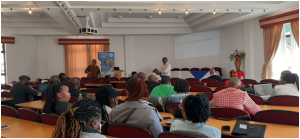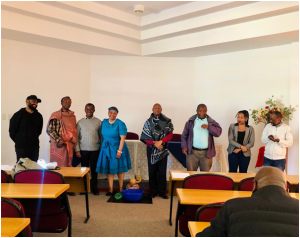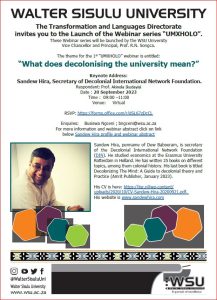Sandew Hira, October 8, 2023
The question
In my book Decolonizing The Mind – a Guide to Decolonial Theory and Practice I wrote the following in a paragraph dealing with Palestine: “If in any of the coming rounds of fighting between Israel and the Palestinian resistance the Palestinians stand their ground and a prolonged war between Gaza and Israel ensues, then international forces will come into play for the final battle which will cease to be an air battle.” I pose the question: “Will Israel still exist in the coming decades?” [1]

In an analysis of the war of 2021 I draw the following conclusion: “The next stage might be the final round if we are looking at it in the context of World War III, the US or Israel could use a nuclear bomb to ensure their survival.”[2]
The conclusion is that Israel might not exist in the coming decades.
This article provides a decolonial analysis of the new war of yesterday, October 7, 2023. Its conclusion is: Israel might not exist in the coming years.
The theoretical framework
We live in dangerous times. If we use Western media as a guideline to understand current events, we will not understand the danger and how to deal with it. The Western narrative of the current stage of world politics is very simplistic. We live in a world in which freedom and democracy is under attack. Barbaric and despotic forces there attacking Western civilization. Hamas is a terrorist organization. Israel is a beacon of Western civilization in the heart of a backward oriental region. Israel and its Western supporters are so mighty that they will easily beat the forces of evil.
This narrative is part of mental slavery, the colonization of the mind. A mechanism of mental slavery is that Western media prevent other voices that contradict their narrative to be heard. So the contradiction come from reality. When reality does not conform their narrative, they panic. They think that there something wrong with reality.
I use the theoretical framework of Decolonizing The Mind (DTM) to explain what is going on now and what we can expect in the coming period.
One element of DTM is the use of imagination as a source of knowledge. Western analysis is based on observation and reasoning. The future is an extrapolation of the past. When they look at Palestine, they see Israel, a strong military power with nuclear weapons and the strongest possible support from the West: militarily, politically, economically and culturally. How can this power be defeated by a group without this kind of support? Given this framework the only outcome of the current war is that Palestinians pay a very high price for their resistance in the forms of thousands of casualties and eventually go into submission.
In the DTM framework the future is not an extrapolation of the past. It is perfectly possible to have sharp breaches in the currently line of development that fundamentally alters the future. In under to understand this argument, you should use imagination.
I give a few examples in the book.
Imagine that you are a African who was born into enslavement in the USA. You have witnessed the defeat of the rebellion of John Brown (1800-1859) in 1859. Brown was a white abolitionist who organized a group of 22 men, among them five Africans, to start a rebellion that should have brought down the system of slavery. They attacked an arsenal with arms and ammunition in Harpers Ferry, Virginia. They called upon the enslaved Africans to rise up in a general rebellion. But there was no response. The US army quickly captured the group. Some were killed immediately. All, but one of Brown’s sons, were executed after a trial. In those circumstances if somebody would have told you, that six years later slavery would be abolished in the United States, you definitely would have answered that this was a ludicrous fantasy. And yet, six years later the impossible became possible.
Imagine that you are a European that looks at Europe on January 1914. The Ottoman empire and the Austr0-Hugnarian Habsburg empire had existed for 600 years. The Russian empire had existed for 200 years. The German empire was united from different 26 different territories states into one vibrant centralized state. In 1914 Kaiser Willem II seemed to stronger than ever. If someone would have told you that within eight years all these empires would not exist anymore, you would think that this is just a fantasy.
Our sense of time can deceive us when we talk about history. The difference between 1914 and 1970 is 56 years. In half a century the world has changed dramatically. There were two World Wars. World War I was just finished and World War II was one its way and one pandemic (Spanish Flu). Much of the global south was politically colonized by the global north. By 1970 the majority of the global south was politically independent. The Internet and personal computer, let alone mobile telephones, did not exist in 1970.
The difference between 2023 and 1970 is more or less same as the difference between 1970 and 1914. And this period has also seen dramatic changes in the world. China and India have risen from the ashes of the colonial period to become major economic and political players on the world stage. The Soviet bloc has dissolved and out of those ashes the Russian Federation has risen as a major military power. Germany has been united. Iran has become a major geopolitical force. We are experiencing a pandemic (COVID-19). The Internet technology has changed the world in a way nobody could have foreseen.
Yet, when we compare 1914-1970 with 1970-2023 it feels as if the gap between 1914 and 1970 is far bigger than the gap between 1970 and 2023, probably because we are still in one generation that is living through the current era. We feel as if the period 1914-1970 is closed, while we still seem to be living in the second period.
Now imagine how the world will look in fifty years, say in 2072. Can we imagine a change that is so drastic that we regard the period of 1970-2023 as a period that we have closed as humankind?
I will now use imagination to envisage the dramatic changes that might take place in the coming years.
The principles of decolonial imagination
The first principle for decolonial imagination is the use of the concept of civilization to analyze world history. In Marxism they use class as a concept of analysis. In Liberalism is about individualism. A civilization is a collection of societies with a specific cultural base: knowledge, ethics and views on how to organize and structure a society. It has economic institutions that produce goods and services that can sustain highly developed social, political and cultural institutions. It has political institutions that structure the relationship between the rulers and those being ruled in the form of a state. It has social institutions that organizes social relations in a civilization. It has a cultural base with institutions for knowledge production (universities) and knowledge dissemination (media, education) that produces material and non-material culture.
Western civilization is based on colonialism. It is very young (500 years) and already its demise has already started. Israel is part of Western colonialism: the last vestige of an apartheid settler state. So if I talk about the demise of Israel I put it in the context of the demise of Western colonialism and Western civilization.
The second principle of decolonial imagination is to answer the question: what are the forces behind the demise of Western power and civilization? In the DTM framework I look at four forces: economic, social, political and cultural.
We are living in a different economic world compared to 50 years ago. China is now the largest economy and is a key driver in world economy. The economic power of the West had deteriorated to such an extent that it has lost much of its financial and economic power. It is not the driver in technological innovations. China is. The economic power that backs Israel is not as strong as it used to be.
The social institution of racism – the organization of social relations on the basis of superiority and inferiority along racial and ethnic lines – is eroding rapidly. If someone would have told you in 2006 that a black man would be president of the American empire in 2009 and receive the Nobel Prize for peace while carrying out the largest bombardment of Afghanistan, you would not believe it. If someone would have told you in 2020 that a Indian Hindu would be prime minister of the United Kingdom in two years time you would dismiss this is nonsense. Yet all these things are happening. They us that the social institution of racism that supports the base structure of Western civilization are not so strong anymore. Israel is seen by themselves and the West as part of Western social institutions.
The international political institutions of the West have lost their hegemonic influence in the world. New institutions are gaining more influence by the day: BRICS and SCO. Regional powers are gaining international strength: Western Asia with Iran as a major power; Latin Abya Yala (former Latin America) with Venezuela and Cuba as leading states. In Africa South Africa is a leading power in Africa. The continent as a whole is asserting is influence in global matters. Israel is functioning in this international political climate. And is a weaker party in international politics. There are desperate efforts with the Abraham Accords to reverse this trend, but they are going against the historical process of the decline of Western political power.
Western cultural power is declining. Everywhere in the world there is a movement for decolonizing knowledge. It is critique of the Western Enlightenment, the basis of Western culture. There a rise of knowledge from other civilizations that are taking hold in different universities around the world. The support of the apartheid state of Israel in the West is organized by institutions like universities, media and other cultural institutions. I discuss the Israel Advocacy Handbook (IAH) to show that even the Zionist think that the support of Israel is declining. The IAH is a guide on how to colonize the mind in Western Europe and the USA to mobilize support for Israel. It says: “In the last decade, there has been a dangerous and steady erosion in international perceptions regarding the legitimacy of Israel. At the same time, there is an erosion of support for Israel on particular issues in both the United States and Europe. The two problems are intimately related. The crisis is more serious in Europe than in the USA. There is not yet an Israel public relations disaster in the USA, where support levels generally hover between 50 and 63%, but even there, the problem cannot be ignored.”[3]
My conclusion is that the current war takes place in an international context that might lead to the dissolution of the state of Israel. The international economic, social, political and cultural power for this support has been severely weakened.
The third principle of decolonial imagination is the proposition that injustice will someday come to an end. Western slavery has lasted 350 years in Abya Yala. Apartheid in South Africa came to an end thirty years ago. The occupation of Palestine will come to end. The question is not whether it will come to an end, but when and how?
The lessons from the resistance
The first lesson from the resistance against the occupation of Palestine is that it has grown in strength to an unprecedented scale in its history.
The colonization of Palestine for the Jewish population started well before the Holocaust. In 1917 the British launched an attack against the Ottomans and captured Palestine.
On entering the city of Jerusalem British general Edmund Allenby declared: “The wars of the Crusades are now complete.” Palestine was now a British colony.
Fifteen years after Herzl’s letter the Jewish lobby was able to successfully press the British Foreign Secretary, Arthur Balfour, to make a declaration on November 9, 1917, in which he announced: “His Majesty’s Government view with favour the establishment in Palestine of a national home for the Jewish people and will use their best endeavours to facilitate the achievement of this object.”
The Zionist colonization of Palestine began with a systematic increase of the Jewish population through immigration. In 1917 Jews constituted 3% of the Palestinian population. Under British rule Jewish immigration led to an increase of their share to 30% in 1938.133 Already in this period Zionists had purchased land, uprooted Palestinian farmers with the protection of the British and taken control of the economy with the support of capital from the Jewish Diaspora. This led to repeated revolts by the Palestinians in 1920, 1921, 1929 and a big revolt between 1936 and 1939. A brutal repression of that revolt by the British with the active assistance of Jewish paramilitary forces led to 19,792 Arab casualties, of which 5,032 were fatalities. After World War II, the Zionist colonization of Palestine that began before the Holocaust gained a disastrous momentum when Zionist paramilitary forces started a guerrilla campaign against the British army in order to establish a Jewish state and a terror campaign against the Palestinians in order to expel them from their homes and land. On May 14, 1948, they proclaimed the establishment of a Jewish state on Palestinian land. By the end of the Zionist terror campaign, 700,000 Palestinians had been driven out of Palestine. Their houses and lands were taken over by Jews who came from Europe and the US. People who were born and raised in New York, Amsterdam, London or Paris went to Palestine and occupied the land and houses of Palestinians whose ancestors had lived there for thousands of years. In 1964, sixteen years after the foundation of the apartheid state of Israel in 1948 the Palestine Liberation Organization (PLO) was established to further the liberation of Palestine through armed struggle. The PLO carried out many attacks, but the brutal response of Zionists drove the PLO on the defensive. They had to retreat from Israel, Jordan and Lebanon, eventually moving to Tunisia. It eventually led to negotiations that were concluded in the Oslo Accords in 1993 with the two-state solution. It turned out to be a political defeat for the Palestinians. The Oslo Accords had led to the establishment of the Palestinian Authority (PA) in 1994 as an administrative entity for the future state of Palestine. It had limited administrative power over the Palestinian population in Gaza and the West Bank.
The two-state solution envisioned an independent State of Palestine alongside the State of Israel. From the very start the two-state solution was doomed. It was an agreement on paper only, reached after considerable pressure of the US on Israel. Israel did not accept an independent Palestinian state. It did everything possible to torpedo the Oslo Accords. The Palestinians had no alternative but to struggle for one free State of Palestine in the occupied territories.
In December 1987 the first intifada began with stone-throwing Palestinians and eventually led to the formation of Hamas as a liberation movement dedicated to armed struggle.
In 2000 the second intifada started as a protest against the visit of butcher Ariel Sharon to the Al-Aqsa Mosque site in Jerusalem. It developed into a large scale armed conflict that left 3,000 Palestinians and 1,000 Israelis dead. It ended on February 8, 2005 with an agreement between Israel and the PA on a cease-fire and the release of 900 Palestinian prisoners.
Meanwhile in Gaza 8,000 Jewish settlers living among one million Palestinians in 21 settlements were faced with armed attacks from the resistance. The PA was supposed to prevent this. They could not. In 2005 (from August to September) Israel was forced to relocate the settlers from Gaza, because they could not protect them anymore.
In 2006 Hamas won the Palestinian legislative elections and took control of the government of Gaza. In December 2008 the first Israeli war on Gaza started (Operation Cast Lead) when Israel began with aerial bombardments of Gaza after being unable to stop rocket attacks by the resistance. On January 3, 2009, Israel began a ground invasion of Gaza. On January 21 Israel withdrew its troops after a cease fire was reached under international pressure.
In March 2012, Israel killed a leader of the Palestinian resistance which led to retaliation and a full-scale war with aerial bombardments and rocket attacks. In October of the same year a new round of confrontation began that led to hundreds of Palestinian deaths. In 2014, the worst round of fighting was during a 50-day bombardment of Gaza that resulted in more than 2,000 Palestinians being killed.
In May 2021 the eviction of six Palestinian families living in the Jerusalem neighborhood of Sheikh Jarrah led to mass protests and eventually to a war that lasted for eleven days.
The conclusion from this chronology is that the spirit of resistance is unbroken. The struggle of the Palestinian people comes with a huge price in human suffering. But they have shown that they are willing to pay the price, because the alternative is an eternal life of suffering, humiliation and oppression for them, their children and grandchildren.
The current confrontation that began yesterday is a next level confrontation. The resistance went into Israel with a ground invasion and captured many Israeli’s to bring them to Gaza, among them high ranking officers of the Israeli army. This is unheard of. It defies Western imagination. And it brings to the fore the question: what else is in store for them?
Just from two days of fighting it is clear that whatever follows in the coming day: Hamas has achieved a major victory. The shattered the idea that Israeli’s are safe inside of Israel and their army can always protect them. That is a big victory in itself.
In the book I have explained there are a few factors that will lead to the downfall of the state of Israel:
- There is a growing unity among all major factions in the resistance.
- Arabs in Israel will become an important factor in future confrontation. The longer a confrontation is going on, the greater the chances are that they will get involved in armed struggle. In 2021 they took to the streets in Akka, Lod, Ramla, the Negev, Galilee, and Wadi Ara.
- Many Palestinians thought that a military victory over Israel is impossible. In 2021 it turned out that this is a false idea. At the first day of the current confrontation shows that in a more spectacular way. The stunning way in which the Resistance attacked Israel through a ground offensive emphasized the idea that the Israeli army is not omnipotent.
- The war of 2021 shows that there was a clear international coordination of the resistance: Gaza, Lebanon, Iran and even Iraq. The coordination will only grow in any confrontation that will go on for a longer period.
For the first time in the history of the occupation there is a real possibility that Israel can be defeated militarily. So how will this defeat look like. If your mind is colonized, you will not be able to imagine the dissolution of Israel. But look, already on our lifetime we have seen the dissolution of the German Democratic Republic on October 3, 1990 and the state of the Soviet Union on December 26, 1991.
I foresee two ways in which Israel will cease to exist. The first is by military means. Now Hamas has entered Israel with a few hundred fighter. Imagine a situation in which tens of thousands of fighters from different parts of the world stage and all out attack, capture the military barracks and command control centers, destroy the airfields, destroy the iron dome and capture the nuclear stockpile of Israel. And this all is supported by the state infrastructure of Gaza, West Bank, Lebanon, Yemen, Iraq and Iran. It this impossible? Well think about other things that you thought were impossible and yet they happened.
The second way is the peaceful dissolution of the apartheid state of Israel. The people of Israel come to their senses after they have seen that it is impossible to live a safe live in Palestine. The vote with their feet and leave Palestine. They talk to Europe to organize a peaceful transition to a one state solution.
Given the mindset of the West I think the first option is more likely than the second one.
I have put the relevant paragraphs from the book for a free download here.
Check these links
[1] S. Hira: “Decolonizing The Mind – A Guide to Decolonial Theory and Practice”. Amrit Publisher. The Hague 2023, p. 511.
[2] Idem, p. 512.
[3] Idem, p. 90.

